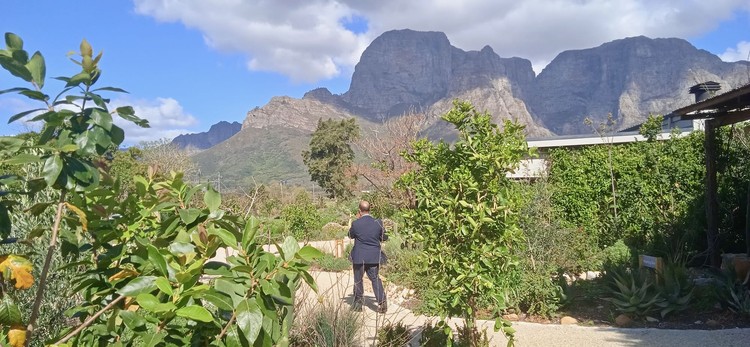
9 September 2024
A participant takes in the indigenous gardens at the Bertha Retreat at Boschendal, Franschhoek, on Thursday during an experts’ symposium hosted by Prof Thuli Madonsela, director of the Centre for Social Justice at Stellenbosch University, on social justice, hunger and the Constitution. Photo: Mike Loewe
Hunger in South Africa is everywhere. That was a message from a roomful of professors, doctors, social justice activists and a judge at the Bertha Retreat near Franschhoek on Thursday.
The host, Professor Thuli Madonsela, director of Stellenbosch University’s Centre for Social Justice, added her voice to the science-based and experiential research commentary delivered at the symposium. In an almost ten-hour day crammed with 36 presentations, Madonsela spoke of her own encounter with the pangs of hunger. As a child in Soweto, she made sure she never missed events where food was on offer, especially at her church on Sundays.
Researchers, including the South African Human Rights Commission (SAHRC) have dubbed it “slow violence” – meted out to the most vulnerable, among them children, from the womb to five years old.
SAHRC Eastern Cape manager Dr Eileen Carter spoke of the findings of the commission’s inquiry into malnutrition in the province, released last year. It discovered that officially out of 1,087 starving children in the Eastern Cape, 116 died from severe acute malnutrition in 2021/22.
The grim table of death from malnutrition was:
Even though there is a surplus of food, more than enough to feed starving children and adults, the symposium heard how tons of food gets dumped because of financial concerns among corporate retailers and agri-industry.
Professor of Education at Stellenbosch University Jonathan Jansen bluntly described the failure to feed people based on arguments about budget cuts and policy considerations as “vile”.
“There is no theory to explain it,” he said. “Adults are playing games with the nutrition of children. Let’s stop everything and demand that the state makes a correction. Why is there no demand to stop everything and get it right?
“Food is a right and a matter of social justice and not a resource subject to social, economic or political considerations.”
Led by Madonsela, the group, whose symposium submissions will be used to draw up a policy paper for the government, agreed that the country needed to move beyond the notion of “charity”, to the constitutionally enshrined right to food when dealing with starving people.
When it comes to children, the right to food with nutrients – in Section 27 of the Bill of Rights – has “no limitations” and there is no provision for legal argument about a lack of money or other resources in the Treasury or elsewhere in government.
The section, interpreted in the 2020 ruling in the case brought by Equal Education against the Minister of Education, was that the right to basic nutrition for children “is immediately realisable”.
Disclosure: The Bertha Foundation is a GroundUp donor. Although the conference was held at the Bertha Centre it was not the organiser of the event and no donor has any say whatsoever in GroundUp’s editorial policy or what we cover.